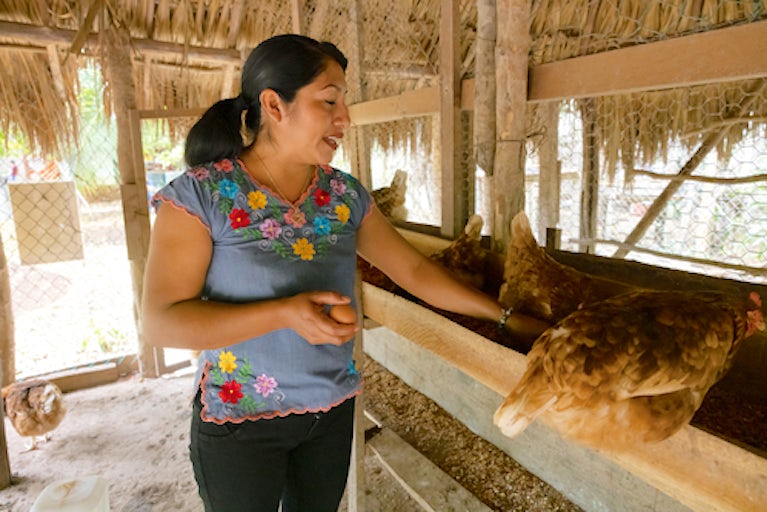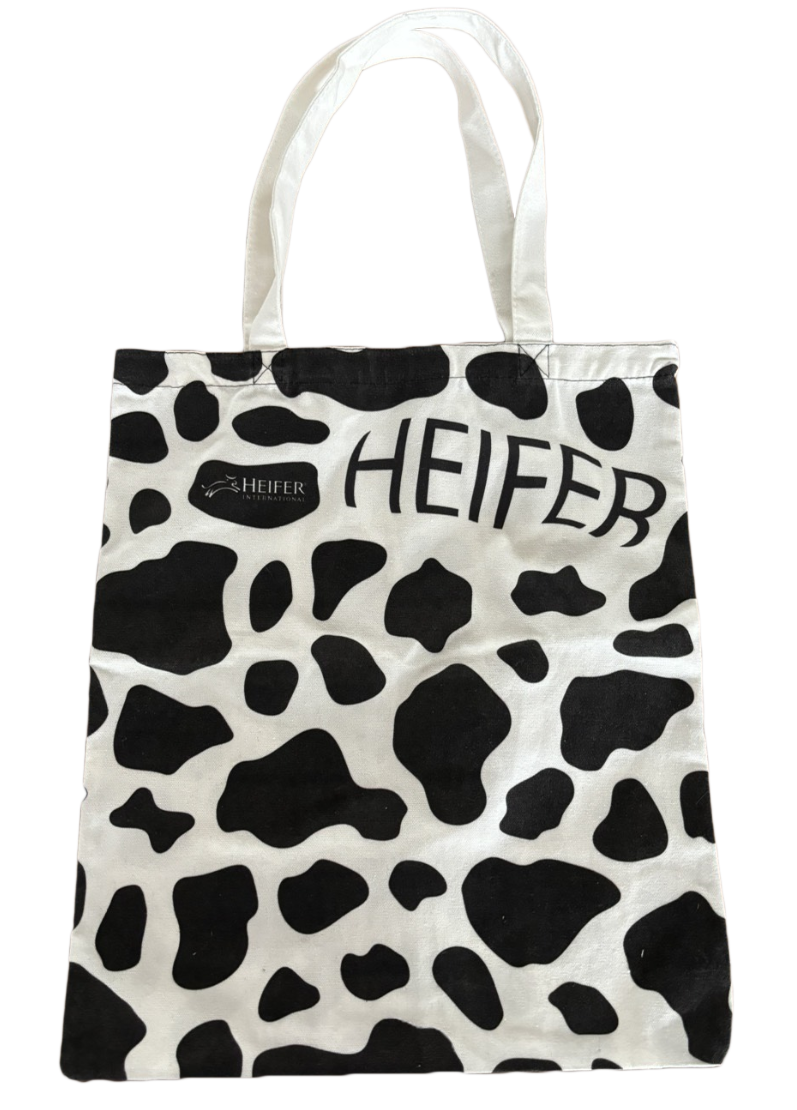Transforming Lives in Mexico, Tanzania and Nepal
January Impact Story


Hens bring hope in Mexico
“If men can do it, why can’t women?” This is the question Lidia Maribel Moo Poot poses whenever she and other women in her business collective encounter gender discrimination and other obstacles as they work to develop sustainable livelihoods — and financial independence — in rural Mexico.
Lidia knows firsthand that gender disparity holds families, and entire communities, back. So alongside her peers in the Kikibá women’s collective — a group of Maya women in Yucatán and Lidia’s home state of Quintana Roo — she’s building a cage-free egg business and choosing a different outcome.
In 2020, Heifer Mexico collaborated with the W.K. Kellogg Foundation and women in Quintana Roo and Yucatán to establish the Kikibá collective to help meet the demand for ethically-produced, cage-free eggs and increase the women’s income-earning potential. Thanks to your generous support, members of the collective each received hens and training sessions on sustainable, cage-free poultry rearing; financial literacy and business management; egg traceability and food safety.
Today Lidia earns a living wage and can even help her daughter pay for her college tuition. And these life-altering changes would not be possible without you.
Across the collective, women now contribute, on average, 12 percent of their total household income. And the number of women who engage in household decisions regarding income has reached 100 percent, up from 66 percent at the start of the project.
Lidia’s resolve — and the resolve of her colleagues in the collective — isn’t going unnoticed. In addition to their new skills and earnings, Lidia and her colleagues are developing a sense of community that has become, for many members, vital. “If someone in the group has a problem,” Lidia said, “she shares it, and we as a group, as women, can support her, both morally and economically. That’s what we do.” And it’s your commitment to and vision for a better world that has made all of this possible for Lidia and everyone in her community.

Sustainable dairy farming transforms lives in Tanzania
“Life was so tough,” Evenule Joram said, recalling his family’s daily diet of cooked taro roots and scant, sometimes sour, milk. Despite their hard work, Evenule and his wife Rebecka failed for years to earn a living wage on their smallholder farm in southwestern Tanzania where they grow bananas, coffee and tea and raise dairy cows.
Today, with help from the Tanzania Milk Processing Project, delivered in partnership with Tanzanian governmental agencies, nongovernmental organizations, private-sector institutions, the Sokoine University of Agriculture and many community-based farmer producer organizations, Rebecka and Evenule are prospering, and other smallholder farmers like them around the country are, too.
For Rebecka and Evenule, the project was life changing. Training, often facilitated by the farmers themselves through self-help groups formed by the project, helped farmers address the spectrum of challenges they once faced. For example, learning about animal nutrition and hygiene helped Rebecka and Evenule enhance their cows’ quality of life and improve the volume and quality of the milk they produce. “Now there are no diseases,” said Evenule. “There are no ticks. The cows are extremely clean.”
Through the Tanzania Milk Processing Project alone, the volume of milk collected for the formal market rose from 55,817 liters per day to 129,000 liters per day. As a result, the project participants — 54,072 of the country’s smallholder dairy farmers — increased their monthly household income by 36 percent. These farmers now have a newfound sense of financial stability and can be confident about their futures — all thanks to you!

Planting seeds of hope in Nepal
In the remote hills of western Nepal where Til Kumari Nepali was born and still lives, there are not many economic opportunities. The country as a whole — one of the world’s poorest and least developed — relies greatly on outsiders in the form of aid and tourism. Agriculture is also key with more than 80% of the population engaged in it.
Til’s family reared cows, buffalo, poultry, and pigs. They also grew crops and sold what they didn’t consume. Still, it was not enough, so Til’s father worked as a day laborer in other people’s fields and as a construction worker. Til’s oldest brother only made it to grade seven before he went to India at age 18 to work. Another brother also made his way to India to work at the age of 20. Til’s husband, Bijay Nepali, used to work in India and now works as a cook in Kuwait.
Through Heifer’s Nepal Government Partnership for Economic Growth (NGP) project and others like it, Heifer is trying to keep Nepalese from migrating by providing them with better economic opportunities at home — with your support!
Through partnership with a local organization in Til’s community called Social Rights Help, Heifer helps farmers form cooperatives composed of smaller Self-Help Groups. The cooperatives are designed to function as a business hub that help members improve the quality of their production, better manage their businesses and improve market access.
The local government started by giving Til and other farmers turmeric seeds. They cleared barren land, planted the turmeric, and the crop thrived. Soon the farmers moved from just growing enough for themselves to producing turmeric for sale.
Til and the other farmers have improved their processes and learned about the advantages of organic manure. They also learned how to weed their plants and how to plant in organized rows. More importantly, your kind giving has provided the necessary funds to invest in machinery to improve the processing of turmeric and a space in which to do this.
“Turmeric manufacturing and processing is quite difficult, particularly when it’s done manually,” explains Til. “On top of that, it could be time consuming as well when we do things manually.”
Once they start the processing in bulk, they will work with the already existing farmers’ cooperative Hitaishi to buy, process and resell the turmeric. Til hopes the new technology will aid the whole community.
For Til and the other women in her group success isn’t measured individually but as a community, explains fellow group member Phulmaya Burmeli, who is 33.
“We believe in the principle that initially we should work on strengthening the group. If the group becomes stronger than automatically the members would become strong,” says Phulmaya.
Your kind spirit has made this possible: A future where Til and the other women in her group are able to elevate themselves and each other, creating a reality where they can end the cycle of hunger and poverty in their lives.

